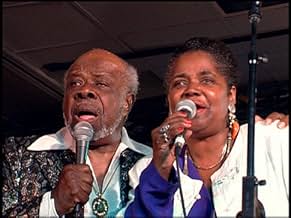AVALIAÇÃO DA IMDb
6,6/10
318
SUA AVALIAÇÃO
Adicionar um enredo no seu idiomaA film featuring the veteran soul music artists and music of Stax Records.A film featuring the veteran soul music artists and music of Stax Records.A film featuring the veteran soul music artists and music of Stax Records.
- Prêmios
- 3 indicações no total
Avaliações em destaque
Having seen "Standing in the Shadows of Motown" recently put me in the mood for film retrospectives of recent black music to see how it has stood up, how it has influenced the wider culture of the western world and what the original artists are doing now. Similar to "Shadows" this film mixes live performances from the artists today with talking heads although here there are fewer set interviews and more recollections captured on the move as it were. This helps make the film feel a lot livelier and engaging because it doesn't come over as being rehearsed or set in a studio but rather being personal and just like talking to these people, as natural as being with them in person.
Although the film doesn't manage to convey a real time line or history to help the unfamiliar, it does provide a fan's excitable view of the scene hence the film is best when just chilling out with the artists. To some this may be a missed opportunity because it could have easily been longer and more interesting, but as it is it does still work as a bit of reminiscing as opposed to actually recording the people and the songs for posterity as more of a documentary no matter what Hegedus' aim, the film just doesn't manage to do that well at all. In fact Hegedus is a bit of a problem generally his narration is gradually dropped and just as well as he has a whiney little voice and doesn't add anything of value; having him kicking around on screen is a distraction as well and it shows he was perhaps a bit too distracted as a fan to be able to do the job of producer/director effectively.
The performances are strong and the artists involved are older but still funny and entertaining in differing ways. As a "fan's" film, we are not allowed to really look too closely at any of them and anything even slightly negative is mostly glossed over in a rather annoying fashion although I can see why, after all, the film wasn't aiming for documentary so much as it just capturing the people and recent performances. Overall this is an enjoyable film thanks to the people and the performances; it may not have the depth and detail that I would have liked it to have had in regards capturing the times of Stax and looking at the life of the artists after the success, but it doesn't try to do this and is still enjoyable for what it does do and will be enjoyed by fans of the music and the performers.
Although the film doesn't manage to convey a real time line or history to help the unfamiliar, it does provide a fan's excitable view of the scene hence the film is best when just chilling out with the artists. To some this may be a missed opportunity because it could have easily been longer and more interesting, but as it is it does still work as a bit of reminiscing as opposed to actually recording the people and the songs for posterity as more of a documentary no matter what Hegedus' aim, the film just doesn't manage to do that well at all. In fact Hegedus is a bit of a problem generally his narration is gradually dropped and just as well as he has a whiney little voice and doesn't add anything of value; having him kicking around on screen is a distraction as well and it shows he was perhaps a bit too distracted as a fan to be able to do the job of producer/director effectively.
The performances are strong and the artists involved are older but still funny and entertaining in differing ways. As a "fan's" film, we are not allowed to really look too closely at any of them and anything even slightly negative is mostly glossed over in a rather annoying fashion although I can see why, after all, the film wasn't aiming for documentary so much as it just capturing the people and recent performances. Overall this is an enjoyable film thanks to the people and the performances; it may not have the depth and detail that I would have liked it to have had in regards capturing the times of Stax and looking at the life of the artists after the success, but it doesn't try to do this and is still enjoyable for what it does do and will be enjoyed by fans of the music and the performers.
Directors Chris Hegedes and D.A. Pennebaker's documentary, while not clarifying more about the musicians, evoke a bygone era and the glorious music these artists we see in the film gave us.
We owe a great debt of gratitude to the talented performers showcased in the film. They gave the American public, and the world at large, some of the best songs of the 20th century. Their stories are presented for their fans to cherish. We remember how great these artists were. These performers take us back to many hours of pure entertainment they gave to their adoring fans and how generous they were with their enormous talent.
We see in the movie giants of the popular music such as William Bell, Jerry Butler, The Chi-Lites, Isaac Hayes, Sam Moore, Ann Peebles, Wilson Pickett, Mary Wilson, Carla Thomas. among others.
Their stories and recollections are captured in the documentary. This is a film to cherish by all popular music lovers.
We owe a great debt of gratitude to the talented performers showcased in the film. They gave the American public, and the world at large, some of the best songs of the 20th century. Their stories are presented for their fans to cherish. We remember how great these artists were. These performers take us back to many hours of pure entertainment they gave to their adoring fans and how generous they were with their enormous talent.
We see in the movie giants of the popular music such as William Bell, Jerry Butler, The Chi-Lites, Isaac Hayes, Sam Moore, Ann Peebles, Wilson Pickett, Mary Wilson, Carla Thomas. among others.
Their stories and recollections are captured in the documentary. This is a film to cherish by all popular music lovers.
A lot of different snipets make up the whole of this documentary, which is somewhat confusing and leaves us with a pretty anti- climatic ending. But the stories, voices and music more than make up for it. I was particularly impressed with the beautiful voice of Carla Thomas, and Issac Hayes just might be the coolest cat on the face of the Earth. Rufus Thomas and the radio show are good for more than a few laughs.If you like Soul music and its history, this one is certainly worth a look. 8/10.
Taken from R&B pioneer Jerry Butler's most enduring hit, the title of this upbeat, soulful documentary provides an evolution of R&B in the cities across the nation where soul music flourished between 1960 and 1975.
Opening with 82 year old Rufus Thomas, referred to as Memphis' "Other King," he was still broadcasting his popular weekly program in Memphis, credited with giving soul music and R&B its start, moving on to Philadelphia, New York, Chicago and Detroit. A legend in his own right, as a disc jockey, Rufus was the first to play Elvis Presley records for black audiences.
Loaded with incredible concert footage, the performers prove that they can still enthrall audiences in an undiminished capacity years after their peak of popularity. The ageless Wilson Pickett is mesmerizing as ever on stage, while Jerry Butler croons a smooth love song. Sam Moore is truly electrifying, especially when he performs "When Something Is Wrong With My Baby." Isaac Hayes is honored, calling attention to his major role at Stax Records, where he wrote or co-wrote many of its major hits. Most touching is Rufus Thomas, who recently died at 84, in a duet with daughter Carla on "Night Time Is the Right Time." Sam Moore recalls his dark days as a drug pusher, and despite his age (and a triple bypass) Rufus Thomas delivers a dynamic performance (sadly, he died in December 2001, just as "Only the Strong Survive" was being completed for its premiere at Sundance).
This graceful film also showcases soul music legends Mary Wilson, the Chi-Lites, Carla Thomas and Ann Peebles, exuding a lack of bitterness and gratefulness for the good things and a relentless energy to continue on with their talents as the true artists that they are.
Opening with 82 year old Rufus Thomas, referred to as Memphis' "Other King," he was still broadcasting his popular weekly program in Memphis, credited with giving soul music and R&B its start, moving on to Philadelphia, New York, Chicago and Detroit. A legend in his own right, as a disc jockey, Rufus was the first to play Elvis Presley records for black audiences.
Loaded with incredible concert footage, the performers prove that they can still enthrall audiences in an undiminished capacity years after their peak of popularity. The ageless Wilson Pickett is mesmerizing as ever on stage, while Jerry Butler croons a smooth love song. Sam Moore is truly electrifying, especially when he performs "When Something Is Wrong With My Baby." Isaac Hayes is honored, calling attention to his major role at Stax Records, where he wrote or co-wrote many of its major hits. Most touching is Rufus Thomas, who recently died at 84, in a duet with daughter Carla on "Night Time Is the Right Time." Sam Moore recalls his dark days as a drug pusher, and despite his age (and a triple bypass) Rufus Thomas delivers a dynamic performance (sadly, he died in December 2001, just as "Only the Strong Survive" was being completed for its premiere at Sundance).
This graceful film also showcases soul music legends Mary Wilson, the Chi-Lites, Carla Thomas and Ann Peebles, exuding a lack of bitterness and gratefulness for the good things and a relentless energy to continue on with their talents as the true artists that they are.
Fans of soul music of the sixties and seventies will thank Miramax Films for bringing this work to the screen. Mogul Harvey Weinstein, who amasses a number of Oscars each year, including Chicago for 2002 Best Picture, could have made a lot more money with other films. I suspect he loves this music as much as I do, and he appears briefly in the movie.
Legends Jerry Butler, Wilson Pickett, Sam Moore of Sam & Dave, Mary Wilson of the Supremes, Isaac Hayes, the Chilites (all original members) and Carla Thomas are seen as they are now in their early sixties. This picture was made in 1999, and Rufus Thomas, who appears in the film, passed away in 2001 at 84. They perform their vintage hit songs, are interviewed, and reminisce about their early days with Stax Records, Motown's competitor. All are doing well, although they've gained weight. Jerry Butler, the Iceman, sings his classics: the title song and For Your Precious Love. We learn he returned to college in his fifties, and is now a Commissioner in Chicago. Hayes (Shaft) and Butler retain their strong, rich voices. We're also treated to a cameo archive of Otis Redding.
This film reminds me of its close relative, Standing in the Shadow of Motown. That work is richer in exploring the lives of cast members, and elicits from them more heartfelt emotions of what it was like socially, politically and musically to grow up in Detroit in the 1960s. The locale here is Memphis. That movie, however, focuses less on the hit singers, but on the outstanding back-up band, the Funk Brothers. This show features more songs by original artists, but shorter versions of each, whereas Standing includes younger performers doing the complete soundtrack of just a few Motown classics like Heat Wave. Each picture powerfully recreates that wonderful era of soul music in our own salad days.
If there's a film maker who wants to complete the trilogy, he could focus next on the Philadelphia sound of Harold Melvin and the Blue Notes, Billy Paul, Archie Bell and the Drells, MFSB, the O'Jays, Stylistics, Three Degrees, Lou Rawls, etc. I'm waiting eagerly.
Legends Jerry Butler, Wilson Pickett, Sam Moore of Sam & Dave, Mary Wilson of the Supremes, Isaac Hayes, the Chilites (all original members) and Carla Thomas are seen as they are now in their early sixties. This picture was made in 1999, and Rufus Thomas, who appears in the film, passed away in 2001 at 84. They perform their vintage hit songs, are interviewed, and reminisce about their early days with Stax Records, Motown's competitor. All are doing well, although they've gained weight. Jerry Butler, the Iceman, sings his classics: the title song and For Your Precious Love. We learn he returned to college in his fifties, and is now a Commissioner in Chicago. Hayes (Shaft) and Butler retain their strong, rich voices. We're also treated to a cameo archive of Otis Redding.
This film reminds me of its close relative, Standing in the Shadow of Motown. That work is richer in exploring the lives of cast members, and elicits from them more heartfelt emotions of what it was like socially, politically and musically to grow up in Detroit in the 1960s. The locale here is Memphis. That movie, however, focuses less on the hit singers, but on the outstanding back-up band, the Funk Brothers. This show features more songs by original artists, but shorter versions of each, whereas Standing includes younger performers doing the complete soundtrack of just a few Motown classics like Heat Wave. Each picture powerfully recreates that wonderful era of soul music in our own salad days.
If there's a film maker who wants to complete the trilogy, he could focus next on the Philadelphia sound of Harold Melvin and the Blue Notes, Billy Paul, Archie Bell and the Drells, MFSB, the O'Jays, Stylistics, Three Degrees, Lou Rawls, etc. I'm waiting eagerly.
Você sabia?
- Citações
Wilson Pickett: I got him now! I got him now, boy! I knew I'd get him!
Principais escolhas
Faça login para avaliar e ver a lista de recomendações personalizadas
Detalhes
- Data de lançamento
- País de origem
- Central de atendimento oficial
- Idioma
- Também conhecido como
- Only the Strong Survive
- Empresa de produção
- Consulte mais créditos da empresa na IMDbPro
Bilheteria
- Faturamento bruto nos EUA e Canadá
- US$ 57.581
- Fim de semana de estreia nos EUA e Canadá
- US$ 22.035
- 11 de mai. de 2003
- Faturamento bruto mundial
- US$ 63.778
- Tempo de duração
- 1 h 35 min(95 min)
- Cor
- Mixagem de som
- Proporção
- 1.85 : 1
Contribua para esta página
Sugerir uma alteração ou adicionar conteúdo ausente



























